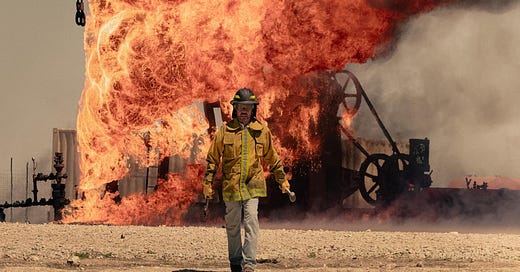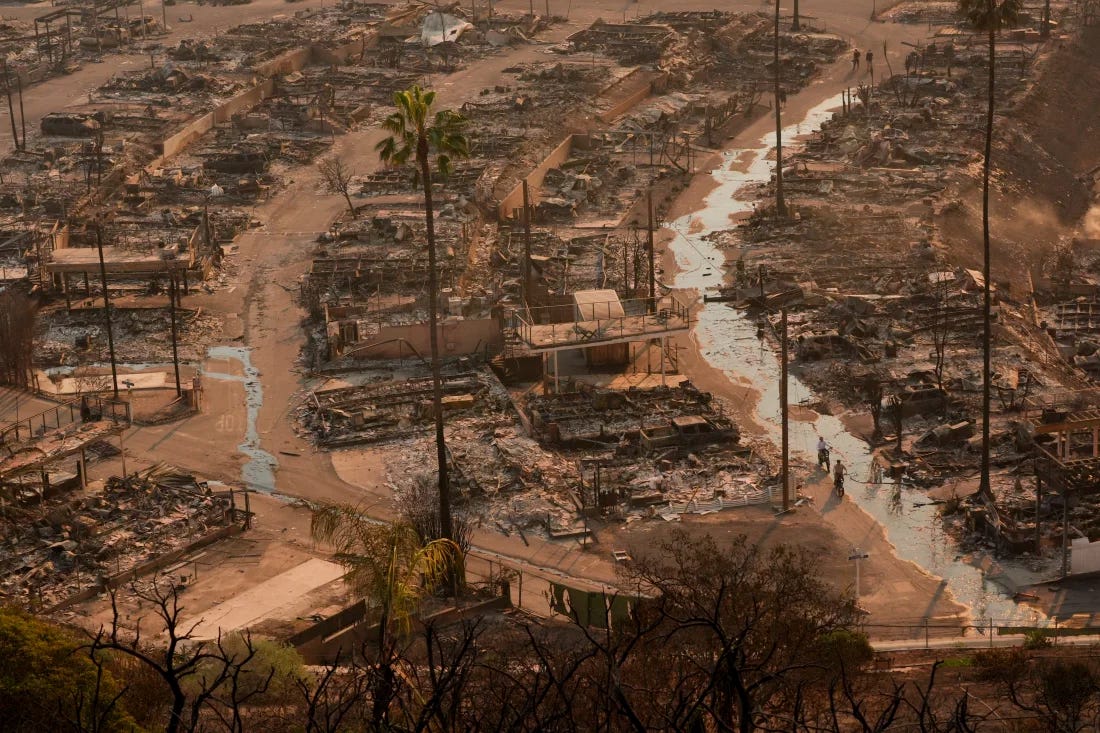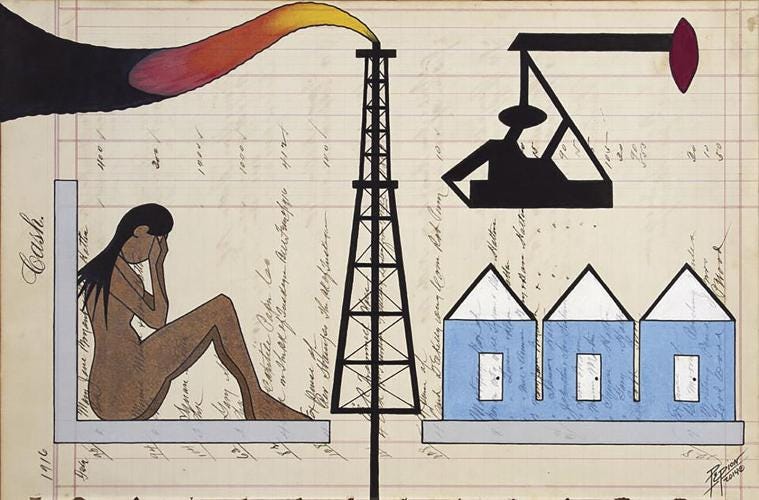Drill, Baby, Drill; Burn, Baby, Burn
The Climate Nihilism of Taylor Sheridan’s "Landman" and Its Celebration of Petro-Masculinity
In Taylor Sheridan’s signature series about the modern West, Yellowstone, the landscape is depicted as a timeless treasure threatened by various putatively liberal scourges, all centered in Bozeman’s growing Californication – yoga emporiums, overpriced boutiques featuring ersatz cowboy couture, permissive parents of entitled brats, and every species of sanctimonious Left Coast woke.
Culture-war pearl-clutching aside, on planet reality, the climate crisis is the accelerating disaster that eclipses every other affliction and conceivable complaint. However, in the show, it is never mentioned or perhaps deliberately omitted. Interestingly, in the background of numerous scenes, the repressed returns in the form of smoke from Montana’s increasingly catastrophic wildfires. The smoke, while ever-present, is acknowledged only once in the script, presumably because it sullied the bucolic vistas to the point that it couldn’t be ignored or doctored by the film crew. After a naïve tree-hugging environmentalist expresses alarm over it, one of Dutton’s ranch hands calmly but with notable exasperation cowboy-splains that the fires are caused by lightning and are thus a normal, seasonal occurrence and an unavoidable feature of nature’s predictable cycles.
Meanwhile, back in the world outside Sheridan’s right-wing morality tale, Montana’s forests have been devastated by a decidedly abnormal degree of drought, beetle infestation, and cataclysmic fires. The massive death of trees has turned those forests from a carbon sink into a net carbon emitter. Ironically, in the wake of that destruction, the endeavors that the Dutton family most revere are also imperiled, such as ranching, rodeos, hunting, and fishing.
In Sheridan’s new conservative fable, Landman, he shifts from climate denial to climate nihilism. Human-caused global warming is real but unavoidable. Yes, we’re headed for disaster, but all the proposed solutions for eliminating fossil fuel dependency would only worsen matters. It’s best to extract all we can, make a buck, and keep our truck tanks full.
Tommy Norris, played by Billy Bob Thornton, is the strenuously grizzled tough-guy-with-a-heart-of-gold landman fixer for the oil company M-Tex. It’s a profitable but midlevel company that exploits ruthlessly, battles the ever-meddling federal government over its pointless regulations, and makes mutually backscratching deals with murderous local Mexican drug cartel leaders. Unlike the big guys, such as Exxon-Mobile, it treats its employees like family, even as it constantly puts them in harm’s way, assigning jobs that occasionally kill and maim the grumbling but hard-working and loyal petro proletarians. The tumultuous lives of M-Tex CEOs and workers, on and off the oil patch, anchor the show -- their tragedies, safety-defying heroism, violence, mockery of women, and other manly melodramas.
Echoing the conservative hectoring of Yellowstone’s sage “salt-of-the-Earth” ranch hand characters, Tommy responds to a strawman environmentalist’s questions by vomiting up a monologue of pseudo-facts like a MAGA post-truth Wikipedia. He’s another Sheridan character scripted to regurgitate right-wing lies with conviction, like so many Republicans in the real world.
In one scene, Tommy explains to a naïve big-city lawyer that the windmills she sees in the oil fields are used to power equipment that is out of range of the usual utility lines. But he’s quick to point out (falsely and uncorrected in the script) that each one will take 20 years to offset the carbon footprint created by their manufacture. Like so many others in the show, this claim is utterly bogus. One study showed that the actual offset takes an average of 5.3 months. Another found that high-energy output turbines can recoup the carbon required to build them in as little as 64 days. But in the MAGA-verse, anything that affirms their worldview, regardless of disconfirming evidence, becomes gospel and goes viral. A writer for RedState breathlessly proclaimed about that scene and others, “Every left-winger should have his eyes held open and should be forced to watch this on repeat until it sinks in.”
Newsweek offered up an impressive list of well-researched fact-checks in its valiant effort to constrain the gushers of petrochemical industry propaganda that emanate from the mouths of the show’s characters. The reporter, Tom Norton, effectively demolishes the preposterous lies about the impact of, necessity for, and available alternatives to fossil fuel extraction.
Straining to be fair-minded, Norton points out that the series “is by no means an apology letter or puff piece for the oil industry, as it depicts industrial corruption and the inherent human danger involved in drilling.” What he overlooks is that admiring those who get away with corruption and defying, if not denying, life-threatening hazards are key features of the MAGA worldview. Showing the corruption and brutality of the industry is Sheridan’s way of celebrating it. Saying “fuck you” to laws and regulations designed to protect the workforce and the environment upon which all life depends is perfectly consonant with the freedom to harm so often demanded by the Right.
Domination, the other defining value of conservatives, which I discuss extensively in my book, is a theme that runs through Sheridan’s work. The relationship one should strive to have with women, men, animals, and the rest of the natural world is subjugation. Nature is red in tooth and claw. Eat or be eaten. Kill or be killed. Exploit or be exploited. Masculinity itself is defined by one’s success in subordinating others and staying on top. Whether the resource to be exploited is a patch of West Texas dirt that veils a voluptuous oil reservoir or a female body that also exists for the taking, the imperative is the same – drill, baby, drill. The same sentiment can be heard in the current favorite meme of MAGA bros, “Your body, my choice.”
Readers might view the comparison between those two iterations of entitled resource extraction as a rather specious analogy. But I would invite you to consider the research that shows a real-world association between those seemingly unrelated modes of domination. In the North Dakota oil fields, scholars found that after the area was opened for exploitation, the incidence of sexual assault, domestic violence, and stalking rose dramatically in local communities. In the West Texas drilling zones, groping, sexual harassment, and retaliatory actions against women who filed complaints about it are quite common. In Native communities where oil development has advanced, the rate of disappearance, murder, and sex trafficking of Indigenous women has increased significantly. Those associations have not been limited to the oil fields or the US. Another extraction industry, Australian mining, is also a site of profound misogynist violence.
In the more romanticized version of environmental plunder and sexism enacted in Landman, the men are nearly all predators who exhibit varying degrees of compensatory charm. The women generally fit into one of the three stereotypes common to many right-wing narratives. There is the aerobicized, plasticized, borderline anorexic bimbo with an insatiable sexual appetite and an even more powerful lust for shopping, which comes in both MILF and adolescent varieties. They are what all men want, the story tells us. A man who has one is the envy of his peers.
Then there are the non-demanding, self-sacrificing, hard-done-by mothers and wives who possess a certain wisdom but need the help of good men to get by. They are the gender version of the noble savage fantasy. They are nearly all pious Mexican immigrant women in this show. In his hit series Yellowstone, that role was occupied by Native American characters. (The Mexican men in Landman, on the other hand, are depicted as violent, knuckle-dragging thugs who either work for M-Tex or the cartels.)
Finally, we have the phallic women, female characters who exercise a kind of sadistic agency by being even bigger pricks than the men, often besting males in their own pissing contests. The chief example in Landman is Rebecca Falcone, the company’s stiletto-heeled mercenary risk-management attorney. Like her avian namesake, Falcone is a legal predator who swoops in to kill her opposing litigants with grace and skill. She is a heartless consigliere who seems as if she would not think twice about harvesting the organs of widows and orphans if it would boost her employer’s profit margin.
Tommy Norris is a master of the profane bon mot. He oscillates between malignant and benevolent sexism, whatever the occasion calls for. A good representative of his benevolent mode is a scene in which Tommy catches his cartoonishly “hot” daughter smooching a celebrity football star. To express his paternal concern for his progeny’s virtue, he grabs the guy and punches him in the throat.
In Sheridan’s version of petro-masculinity, having a dick means you have to be one – to men, women, and the planet. And fuck those Chicken Littles who whine about extinction. Let’s party while we’re here.
Lastly, it may seem like a trivial and self-indulgent, if not masturbatory, undertaking to analyze the narrative subtext of a TV show. But in a country like the US, where people increasingly eschew facts, evidence, and expertise, what citizens understand about the world primarily comes from the emotionally compelling stories they hear. If nothing else, Taylor Sheridan is a master storyteller. That makes the unexamined and easy to swallow conservative assumptions embedded in his entertaining parables all the more important to identify and challenge. As that ardent RedState author illustrates, a well-told fabrication can easily be more persuasive than bloodless data. But it is not enough to critique the fictions that flatter and enrich oil oligarchs. Those of us on the side of planetary vitality, equality, democracy, and truth must tell better and more enthralling stories.








In a 6 to 1 ruling, Montana’s high court ruled the public's right to a clean and healthful environment under Montana's constitution was violated when the state legislature passed a law removing the impacts of greenhouse gas emissions from environmental reviews under the Montana Environmental Policy Act (MEPA). Chief Justice Mike McGrath authored the opinion. https://www.ktvh.com/news/mt-supreme-court-upholds-held-v-montana-climate-case-ruling#:~:text=In%20a%206%20to%201,Environmental%20Policy%20Act%20(MEPA).